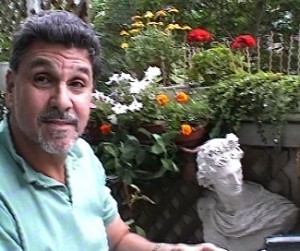Translators Bios of Tesserae
Amparo Arróspide (born in Buenos Aires) is an M.Phil. by the University of Salford. As well as poems, short stories and articles on literature and films in anthologiesand international magazines, she has published five poetry collections:Presencia en el Misterio, Mosaicos bajo la hiedra, Alucinación en dos actos yalgunos poemas, Pañuelos de usar y tirar and En el oído del viento. Another two – Jacuzzi and Hormigas en diaspora- are in the course of being published. A coeditor of webzine Poetry Life Times, she has translated authors such as Margaret Atwood, Stevie Smith and James Stephens into Spanish, and others such as Guadalupe Grande, Ángel Minaya, José Antonio Pamies, Francisca Aguirre, Javier Díaz Gil and Luis Fores into English. She takes part in poetry festivals, recently Transforming with Poetry (Leeds) and Centro de Poesía José Hierro (Getafe).
Robin Ouzman Hislop is on line Editor at Poetry Life & Times, appearances of his works include
Voices without Borders Volume 1 (USA), Cold Mountain Review (Appalachian University, N.Carolina), The Poetic Bond Volumes, Phoenix Rising from the Ashes (an international anthology of sonnets) The Honest Ulsterman and translations into Spanish for CRÁTERA (Autumn 2017). His recent publications are two volumes of collected poems All the Babble of the Souk (2015) Cartoon Molecules (2017) & Key of Mist (2016) a translation from Spanish of poetess Guadalupe Grande all published by Aquillrelle.com available at main online tributaries. Further information about these publications with reviews and comments see Aquillrelle.com/Author Robin Ouzman Hislop & Amazon.com Author Robin Ouzman Hislop
Poets
Robin Marchesi Reviews Cartoon Molecules Collected Poems
Robin Ouzman Hislop’s “ Cartoon Molecules ” is a maze of semantic amazement, a true testament to the magic of words. His uniquely poetic perceptions mesmerise us, metaphysically, to the content of his work. He opens doors within us all not available in the mainstream logic of modern logic.
Hislop’s world goes much deeper, there are no grammatical or structural restrictions to his word flow for he is a literary law breaker. His words resonate with a unique melody that parodies the more surreal, yet equally relevant creations, of the earlier beat generation. It’s a poetry that leaves a haunting trace which may often spring unexpectedly to mind in the oddest moments of time and place. Try them and see for yourself!
Robin Marchesi, born in 1951, began writing in his teens, much to the consternation of his mother, the sister of Eric Hobsbawm, the historian.
In 1992 Cosmic Books published his first book entitled “A B C Quest”.
In 1996 March Hare Press published “Kyoto Garden” and in 1999 “My Heart is As…”
ClockTowerBooks published his Poetic Novella, “A Small Journal of Heroin Addiction”, digitally, in 2000.
Charta Books published his latest work entitled “Poet of the Building Site”, about his time working with Barry Flanagan the Sculptor of Hares, in association with the Irish Museum of Modern Art.
He is presently working on an upcoming novel entitled “A Story Made of Stone.”
Amazon.com A Small Journal of Heroin Addiction Robin Marchesi
Amazon.com Author Robin Ouzman Hislop
Aquillrelle.com/Author Robin Ouzman Hislop
Emanations from the Penumbra Collected Poems by EM Schorb Reviewed at PLT
Emanations front cover only Cover Painting “O Carib Isle” by the Author – ISBN: 978-0-692-03402-6
Editor’s Note: A short while ago EM Schorb contacted me for the address of a mutual friend, whose address he’d mislaid. Remembering i’d published a sonnet of his here in 2013, that later appeared in an anthology of sonnets Phoenix Rises from the Ashes, i promptly requested another contribution from him. One thing led to another and he kindly sent me a copy of his latest collection of poems.
Emanations from the Penumbra. Schorb is a prize winning poet having gained recognition and awards several times over ( see below in his bio), so it was with some trepidation i approached this work with the intention of presenting it at our PLT (Poetry Life & Times ) site. It opens with a quote Penumbra: The “Gray area where logic and principle falter” Hmm – it is in fact a corpus of poems, two hundred pages of them, written by a writer poet, – by that i mean, a person who writes extensively and writes poetry as well. Schorb has an excellent, polished and sophisticated technique in whatever manner he approaches a poetic theme and in Penumbra these are many and varied emanations. He is of course a writer/artist who hails from the USA and he covers widely from its socio historico background, everything from workers rights, the broken war hero to the persecution of blacks by whites. P196. Part 6. titled the same as the name of the collection, starts -/ Poets of my generation are turning up dead. A serial killer is injecting them with cancer heart disease and stroke / and ends / My generation think that this is a serial crime, but have no choice but to pull the ropes and toll the bell / Wow go figure – but as much as there is pessimism and cynicism, there are as many shades of mood together with a host of erudite literary reference ranging from Empson, Scott Fitzgerald, Ezra Pound to Aristotle and Donne to name but a few. The fact that during the time i received and was reading this work, i also happened at the same time to be reading the classic Paterson by William Carlos Williams, i couldn’t help but find similarities and the recognition how a modern poet like Schorb has emerged out of the influences of such a great work in contemporary North American Literature. Carlos Williams set a trend for commentary on the mundane and current affairs in the city, whilst expanding into pure lyricalism, – and this is what happens in Schorb’s work, at least as i experienced it. In particular, i found a quote in Paterson, which Carlos Williams had seized upon, which i thought was entirely applicable to Schorb’s work in Emanations, i quote it here, {recognizing the harmony which subsists between crabbed verses and the distorted subjects with which they dealt – the vices and perversions of humanity, as well as their agreement with the snarling spirit of the satirist. Deformed verse was suited to deformed morality} – Studies of the Greek Poets, John Addington Symonds Vol: 1 P284. I could go on, the pathos of love, nihilism, spirituality are all covered by the poet and often brought out via descriptions of small scenic events like theater clips crafted into a free and flowing verse where the poet is speaking as often as not through another’s voice or persona – though sometimes we find self depreciation as in The Last Word at the end of Part 4. P121. / Edwin Makepeace Thackery Schorb / Wrote many words into his books /…./ Was quite mistaken in all he did /…/ What is the truth? Oh who knows? / Say this: He drank and had to go! / Lets hope he’s not gone forever and comes back. It’s impossible really to select favorites from such a ranging work but i liked especially The Isle of Langerhans P79. Written in vertical inter- facing columns, it makes the reader work hard at reading it and i think that’s important in modern poetry, why should poetry be made easy for the reader to read, it’s the struggle that counts. And here we present at PLT the particular poem Schorb has selected Because P169/70…/ the unicorn is an ungulate because they say so /… Robin Ouzman Hislop
BECAUSE
in the port-cities they have found everything out and
Aristotle-like have put everything into categories
and the unicorn is an ungulate because they say so
because the fine-print of the unreligious sun says we circle it
it is not for us but we for it because the moon hit us
and bounced off instead of was born of our first spin
because the ninth planet is an invading comet caught
and because there is no now and there never has been
because we look upon ourselves in savannas past
knuckling to water because we see the white lemming’s hole
in the snow smashed down by hooves and hear its pitiful
chirp of counter-aggression because the avalanche
indifferently buries the contested world of the snow
valley because stars die because we believe in facts
and because the deluge led to the ark because because
and because we bury our dead and dig up their bones
because the unsoundness of our judgments lead to sound
judgment and because facts are facts and we must reckon
and because the sea is cruel and because time flies
because the wind blows down our houses and because
we remember the snow hare and the hawk because
because the dove is taken in air by the eagle
and because space is either empty or full of dark matter
because galaxies hold for a long time their pinwheel-shapes
because time and space are curved and we can blow ourselves up
and because we blow ourselves up constantly and because
it makes us wonder because doesn’t it mean something
because we are riding a mud-ball through space because
we were born here and because we have categories and
because we dig up our bones and dogs dig our bones up
and because we are not even safe in pyramids because
we dig ourselves up and look upon our own bones

Biography
E. M. Schorb attended New York University, where he fell in with a group of actors and became a professional actor. During this time, he attended several top-ranking drama schools, which led to industrial films and eventually into sales and business. He has remained in business on and off ever since, but started writing poetry when he was a teenager and has never stopped. His collection, Time and Fevers, was a 2007 recipient of an Eric Hoffer Award for Excellence in Independent Publishing and also won the “Writer’s Digest” Award for Self-Published Books in Poetry. An earlier collection, Murderer’s Day, was awarded the Verna Emery Poetry Prize and published by Purdue University Press. Other collections include Reflections in a Doubtful I, The Ideologues, The Journey, Manhattan Spleen: Prose Poems, 50 Poems, and The Poor Boy and Other Poems.
Schorb’s work has appeared widely in such journals as The Yale Review, The Southern Review, The Virginia Quarterly Review, The Chicago Review, The Sewanee Review, The American Scholar, and The Hudson Review.
At the Frankfurt Book Fair in 2000, his novel, Paradise Square, was the winner of the Grand Prize for fiction from the International eBook Award Foundation, and later, A Portable Chaos won the Eric Hoffer Award for Fiction in 2004.
Schorb has received fellowships from the Provincetown Fine Arts Work Center and the North Carolina Arts Council; grants from the Ludwig Vogelstein Foundation, the Carnegie Fund, Robert Rauschenberg & Change, Inc. (for drawings), and The Dramatists Guild, among others. He is a member of the Academy of American Poets, and the Poetry Society of America.
PRIZE-WINNING BOOKS
BY E.M. SCHORB
Books available at Amazon.com
_______________________________________
Dates and Dreams, Writer’s Digest International Self-
Published Book Award for Poetry, First Prize
Paradise Square, International eBook Award
Foundation, Grand Prize, Fiction, Frankfurt Book Fair
A Portable Chaos, The Eric Hoffer Award for Fiction,
First Prize
Murderer’s Day, Verna Emery Poetry Prize, Purdue
University Press
Time and Fevers, The Eric Hoffer Award for Poetry
and Writer’s Digest International Self-Published Book
Award for Poetry, each First Prize
Amazon.com Author Robin Ouzman Hislop
Aquillrelle.com/Author Robin Ouzman Hislop
Antonio Martinez Arboleda Reviews Cartoon Molecules Collected Poems
Cartoon Molecules. Robin Ouzman Hislop. Amazon.com is a brave philosophical and poetic exploration of humanity and the universe, advancing theories of time and space and technological utopias as well as questioning the singularity of humankind.
Hislop’s insightfulness is exuberant. He combines the analysis of the universe through the appreciation of the ephemeral instant with a variety of poetic forms. For instance, he provides sequences of human (or humanoid?) thought, by intelligently staging verse recurrence, notably in the poem “Human Simulation”, when the intertwining of shared words throughout several stanzas provides the baseline of the animation that the alterations of patterns depict, as in the form of sketches for TV cartoons. He also works with infinity mirror effect. The result of this experimental language is a reflection on the relativity of syntax and an invitation to imagine how advanced forms of computers would realise thought.
The cultural references, explicit and implicit, of this book are also worth noting: Kill Bill, the Luddites, Soap operas, Jesus, The Cradle Will Rock, Goya, Alice in Wonderland, Fitterman’s poetry, or Solaris place this book in a constant intertextual conversation full of irony and refinement.
With its ontologically congruent, meaningful and exciting modernism, coupled by more light and luminous verse, such as in the poem “Abandoned Island”, which I had the pleasure to translate into Spanish for CRÁTERA (Autumn 2017), alongside “Dream of the machine”, Cartoon molecules undresses humanity to the barebone to show its place in a world that we believe under our control.
Antonio Martínez Arboleda

www.leeds.ac.uk/arts/people/Spanish Portuguese and_Latin American Studies/Antonio Martinez Arboleda
Tony Martin-Woods.com/2017/08/27/Cartoon-Molecules
Poems from Angel Minaya’s Collected Poems TEOREMA DE LOS LUGARES RAROS (Theorem of rare places)
1.
lugar es una casa para poner un codo no deja de dañar la mesa también sobre los huesos un
palo sus balances
lugar es una puerta para esconder la carga perdura en la cabeza aislada el rastrillo de la
deuda tatúa las membranas
lugar es una ventana para poner un caballo un libro alguna cosa
place is a house to place an elbow the table never leaves off hurting it´s also a stick on
the bones balance sheets
place is a door to hide the burden on an isolated head the rake of debt lingers tattooing
membranes
place is a window to place a horse a book some thing
2.
un niño pasea por las orillas del légamo se parece a mi sombra tiene miedo pero no corre
tal vez sus pies han oído el acre perfume de la ova animales suaves se agitan en el cañizal
un ciervo tendido va confundiéndose con las hojas caídas su cuello muestra linfas secretas el
sol cruje con la intensidad de la corteza columpios oxidados anticipan la ruina de los juegos
juegos solitarios donde el niño me imagina soñando con orillas recordando carroñas sin volumen
el agua verdinegra que el verano va cociendo ambos somos un sueño compartido por el otro
observados bajo las cañas por los ojos feroces de nuestra madre
a child passes silted shores seeming like my shadow he's afraid but doesn't run perhaps his
feet have heard the acrid perfume of the ulva soft animals tremble in reed banks a deer
lying down mingles with fallen leaves his neck revealing a secret lymph sun crackles through
intensity of bark rusty swings herald a ruination of games solitary games where I'm imagined
by the child to be dreaming of these shores a massless memory of carrion the summer's
blackgreenish water is baking we are both a dream shared by the other watched under the
reeds by the fierce eyes of our mother
3.
Conferencia austro-húngara [apuntes]
antes de comenzar imaginemos
pensar en húngaro o escribir en alemán
alguien recoge lo que ama y lo corrige
alguien hubiera preferido someter a reconstrucción una pared escarpada
y ahora yo llevo bajo el brazo
el vínculo entre la fuerza y la risa
el caso es
de dónde procede este placer
después de qué aniquilación maduran los conceptos
por qué admiramos los átomos o la madrugada
queridos colegas
por) un agresor ha sido devorado
como) la frialdad de las madres es comparable a las máquinas zapadoras
en) lo que permanece dentro siempre resulta victorioso
en fin por) como) y en) prueban que una idea es lo más parecido a una cicatriz
o a un sueño que dura ya 51 años
en alemán los ahogados
beben hasta que les llega la muerte
en húngaro los mensajes indirectos acaban alojándose
en órganos e inervaciones habituales
buenas tardes y gracias a todos
por su aflicción
Austro-Hungarian Conference [Notes]
before we begin let us imagine
thinking in Hungarian or writing in German
someone picks up what they love and corrects it
someone would have preferred to rebuild a steep wall
and now I'm carrying under my arm
the link between strength and laughter
the case is
where does this pleasure come from
after what annihilation do concepts mature
why do we admire atoms or the dawn
dear colleagues
by) a foe has been devoured
as) the coldness of mothers is comparable to trenching machines
in) what remains inside is always victorious
hence by) as) and in) prove that an idea is the closest thing to a scar
or a dream that has already lasted for 51 years
in German the drowned
drink themselves to death
in Hungarian indirect messages end up occupying
the usual organs and innervations
good evening thank you all for listening
and thank you all for your suffering
4.
Apuntes catastróficos
contraimagen en el observador nace un estado de malestar o acantilado
contradicción la luz sobre el terraplén se degrada en movimiento
estímulos la vida es una erosión subterránea equivalente al plano inclinado de la
angustia
contragolpe un árbol despliega la tierra rota en dirección al sol blanco de la
analogía
contrapunto los dominios zoológicos se ramifican y expanden como nudos que se
persiguen
impresiones la caza y los territorios acumulan conglomerados de mapas y
desprendimientos
contrasentido un cono o pirámide de escombros pasa de la regularidad a la máxima
turbulencia
contraataque el observador es una trampa para frecuencias de lenta degradación
reducto un germen de catástrofe en favor de la excitación y el desorden
Catastrophic Notes
counter image a cliff state or discomfort is born in the observer
contradiction the light on the embankment degrades in movement
stimuli life is an underground erosion equivalent to the inclined plane of anguish
countercoup a tree displays broken earth towards the white sun of analogy
counterpoint zoological domains ramify their expansions pursued as knots
impressions hunting and territories accumulate clusters of maps and landslides
countermeaning the debris of a cone or pyramid goes from regularity to maximum turbulence
counterassault the observer is a trap for frequencies of slow degradation
stronghold a germ of catastrophe in favor of excitement and disorder
5.
Equivalencia en hueco
[nada] evento de la palabra que lo pronuncia [nunca] agujero o gusano de tiempo oscuro [nadie]
impensada extensión de una antinomia que se fue [nulo] valor absoluto del abandono [pérdida]
extravío en la dirección apropiada [mudez] propósito semántico del niño en silencio [se]
impersonal atavismo del aullido [cero] punto lógico del número a su saco [no] jaque a la
tercera persona oblicua [yo] identidad imaginaria de la cópula y la disyunción [negro] color
automático de las orillas en materia de movimiento [vacío] mensaje contracto del negativo de
los objetos [incógnita] conjunto dispar de soluciones y raíces antes del árbol [significado]
liquidar el poema de materia oscura
del doble tan raro
decirse no expresarse
aunque [yo] estuviera allí
GAP-IN EQUIVALENCE
[nothing] an event from the word that articulates it [never] a dark time or worm hole [nobody]
an unthought extension of a vanished antinomy [null] the absolute value of abandonment [loss]
a misplacement in the proper direction [muteness] the semantic intention of a child's silence
[self] an impersonal atavistic howl [zero] the number's logical point in its sac [not] the
oblique third person placed in check [i] imaginary identity of conjunction and disjunction
[black] the automatic color of edges in the materialisation of motion [vacuum] a message shrunk from the
negatives of photographic objects [unknown] a disparate set of solutions and roots preceding
their tree [meaning] to wipe dark matter out of the poem
by such a rare double
to tell oneself not to express oneself
even though as if [i] was there
6.
WCW 1963
amo las cosas esas cizañas que no dejan ver el mar el sabor oculto de las fresas perceptible
solo en su consumación el zorzal una danza leve en la luz amarilla
hoy una mano escribe y la otra me hace viva la muerte
en otro tiempo el día era el ascenso mis manos ayudaban a nacer palpaban el dolor y la noche
el descenso la medida variable de los huesos quebrados por la música
ahora el perro y la fiebre la oscuridad extensa donde nada tiene cura
van cayendo los ciegos los aros giran la espalda del desierto es la tortuga que sostiene el
mundo
WCW 1963
i love things those ryegrasses not letting you see the sea hidden taste of strawberries
perceptible only in their consummation a thrush a light dance in the yellow light
today one hand is writing and the other is making death alive for me
in another time a day was the ascent my hands helped to give birth they touched pain and night
the descent the variable measure of bones broken by music
Now the dog and the fever a vast darkness where nothing can be cured
the blind are falling rings are turning round the spine of the desert is the turtle supporting
the world
***
Translations from Spanish by Amparo Arróspide & Robin Ouzman Hislop
***
 ANGEL MINAYA (Madrid, 1964), a Bachelor in Hispanic Philology by the Complutense University of
Madrid, was also awarded in PhD in Linguistics by the Autonomous University of Madrid.
A teacher of Literature and Language at a high school in that same Community, some of his poems
and critical reviews have been published by Nayagua literary e-zine. A few have also been
included in the anthology Voces del extremo: Poesía y desobediencia (Madrid, 2014).
Teorema de los lugares raros (Theorem of rare places) is his first published poetry collection
(El sastre de Apollinaire, Madrid, 2017).
http://www.elsastredeapollinaire.com/producto/teorema-de-los-lugares-raros/
https://www.facebook.com/angel.minayaechevarrena
Cartoon-Molecules/paperback/Robin Ouzman Hislop
www.facebook.com/PoetryLifeTimes
robin@artvilla.com
ANGEL MINAYA (Madrid, 1964), a Bachelor in Hispanic Philology by the Complutense University of
Madrid, was also awarded in PhD in Linguistics by the Autonomous University of Madrid.
A teacher of Literature and Language at a high school in that same Community, some of his poems
and critical reviews have been published by Nayagua literary e-zine. A few have also been
included in the anthology Voces del extremo: Poesía y desobediencia (Madrid, 2014).
Teorema de los lugares raros (Theorem of rare places) is his first published poetry collection
(El sastre de Apollinaire, Madrid, 2017).
http://www.elsastredeapollinaire.com/producto/teorema-de-los-lugares-raros/
https://www.facebook.com/angel.minayaechevarrena
Cartoon-Molecules/paperback/Robin Ouzman Hislop
www.facebook.com/PoetryLifeTimes
robin@artvilla.com
Press Release Virtual Living Collected Poems by Gary Beck
Poet Gary Beck’s new collection Virtual Living is a revealing glimpse of how our relationship with the world around us is an ever-evolving experience. Focusing on how humans relate to the world via artificial means, as well as self-imposed affected mechanisms. Beck looks at the concept of living virtually from all angles and tells his story with just enough abstractness to move readers to choose how to inhabit their own worlds. A peek into our world in ways most of us forget to see, these poems will shift any reader’s perspective of how they relate to others, technology and the world.
“Varied, inspiring and insightful – Nous Magazine
“We love your poems – Poetry Pacific
“Amazingly captivating and incredibly diverse – Kind of a Hurricane Press
Virtual Living is a 116 page poetry book. ISBN: 1945247134 Published through Thurston Howl Publications.
Available now through all major retailers
Amazon.com Virtual Living Gary Beck
Birdsong
The closer the highway
the closer to death,
so build your nest
as far as you can
from works of man.
Sports Fans
High school students cheer
at the top of their lungs
for their football team,
unaware of
the math student
ignored by all
who may build the future,
while former sport’s heroes
dwell in the past,
unable to forget
earlier glory.
College students root
for the home team,
eager to belong
to a bigger world,
paint their faces
in school colors,
identifying with
an institution
encouraging sports
more than science,
relegating the brightest
to unrequited dreams
of supple cheerleaders.
Many football fans
either yearn for the past,
or never grew up.
Some fear the future,
apprehensive of
the loss of function,
try to belong,
rooting for their team.
Others don’t realize
pros are as distant
as movie stars,
except they hurt each other
for large salaries,
while loyal fans
wear stupid hats,
wave witless signs,
scream for victory
for favorite teams.
Mindscape
Dreams shatter,
more fragile
than steel, brick, glass
man-made materials,
confining spaces
for the mental container
of hopes, fears, guilt,
unlike other animals
whose sleep exertions
re-enact feeding, flight.

Gary Beck has spent most of his adult life as a theater director, and as an art dealer when he couldn’t make a living in theater. He has 11 published chapbooks and 2 more accepted for publication. His poetry collections include: Days of Destruction (Skive Press), Expectations (Rogue Scholars Press). Dawn in Cities, Assault on Nature, Songs of a Clerk, Civilized Ways, Displays, Perceptions, Fault Lines & Tremors (Winter Goose Publishing). Perturbations, Rude Awakenings and The Remission of Order will be published by Winter Goose Publishing. Conditioned Response (Nazar Look). Resonance (Dreaming Big Publications). Virtual Living (Thurston Howl Publications). His novels include: Extreme Change (Cogwheel Press), Flawed Connections (Black Rose Writing), Call to Valor (Gnome on Pigs Productions) and Sudden Conflicts (Lillicat Publishers). State of Rage will be published by Rainy Day Reads Publishing. His short story collection, A Glimpse of Youth (Sweatshoppe Publications). Now I Accuse and other stories will be published by Winter Goose Publishing. His original plays and translations of Moliere, Aristophanes and Sophocles have been produced Off Broadway. His poetry, fiction and essays have appeared in hundreds of literary magazines. He currently lives in New York City.
www.garycbeck.com
www.facebook.com/AuthorGaryBeck
Cartoon-Molecules/paperback/Robin Ouzman Hislop
www.facebook.com/PoetryLifeTimes
robin@artvilla.com
Weeds. A Poem by Becca Menon
https://commons.wikimedia.org/wiki/File%3AGarden_and_chimney_pot_-_DSC06780.JPG
Weeds
for David
-
Because they are seeing determined seeds
of nameable, nearing death in his body,
he goes in his garden to pull the weeds,
working tranquilly, editing God.

Known for her musical storytelling craft, Becca Menon’s works have been hailed internationally from the Middle East to the United Kingdom. This American translator and author of books of verse narrative has shorter works in print and online. Hear readings and discover other mischief at www.BeccaBooks.com ~
Cartoon-Molecules/paperback/Robin Ouzman Hislop
www.facebook.com/PoetryLifeTimes
robin@artvilla.com
The Truth about Snails. Collected Poems by JD DeHart.
Editors Note: About the Author
In 2014, over the course of some snow days, I put together a collection that would become The Truth About Snails. At the time, most of the writing I was getting to was speculative and science fictional (I guess that’s a word) in nature. So the first collection of poetry I put together reflected this.
Poems were inspired by years as a comic book reader and sci-fi fan. They were not fan fiction, really, but reflected larger themes of science fiction and fantasy that I enjoyed.
This is the text that appears on the back of the book:
“Ordinary objects take on a new form, and myths become real and move next door in the verses contained in this collection. Whether it is a recasting of the myth of Sisyphus, or the titular truth about the origin of our shell-bearing planet dwellers, each poem offers a new view of an old friend. Much of the writing was inspired by the comic books and science fiction, and on concepts beyond the scope of the real world, and cast firmly in the supernatural.”
My hope is that this book can be the first of many. I am already at work on a second collection, which is out for review now, as well as a variety of articles, reviews, and prose works. I reprint some of my favorite poems at jddehartfeaturepoems.blogspot., write reviews and post them at http://dehartreadingandlitresources.blogspot.com/, and tweet @jd_dehart.
Whether you check out this chapbook collection, a future book, or just read my work around the web, I appreciate the read!
The Truth About Snails is now available both on Amazon and Red Dashboard, the publisher’s website at http://cms.reddashboard.com/j-d-dehart/
Vigilante
Pardon me for attempting to be
some kind of hero or otherwise
savior figure. My mistake.
Pardon the garish appearance
of the costume I crafted (it was
a last minute low budget choice)
and pardon my lack of sophisticated
intelligence, weaponry, or astounding
martial arts skills. I am just a guy
who used to read comics, wanted to be
somebody’s emblem, and now find
the feeling of this cape rather awkward.

Bio:
JD DeHart is a writer and teacher. His poems have recently appeared in Dime Show Review and Cacti Fur.
Cartoon-Molecules/paperback/Robin Ouzman Hislop
www.facebook.com/PoetryLifeTimes
robin@artvilla.com




